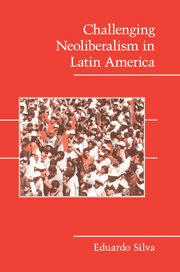Book contents
- Frontmatter
- Contents
- List of Tables
- Preface and Acknowledgments
- List of Acronyms
- 1 THE INCONVENIENT FACT OF ANTI-NEOLIBERAL MASS MOBILIZATION
- 2 CONTENTIOUS POLITICS, CONTEMPORARY MARKET SOCIETY, AND POWER
- 3 THE ARGUMENT: EXPLAINING EPISODES OF ANTI-NEOLIBERAL CONTENTION IN LATIN AMERICA
- 4 ARGENTINA
- 5 BOLIVIA
- 6 ECUADOR
- 7 VENEZUELA
- 8 PERU AND CHILE
- 9 CONCLUSION
- References
- Index
6 - ECUADOR
Published online by Cambridge University Press: 05 June 2012
- Frontmatter
- Contents
- List of Tables
- Preface and Acknowledgments
- List of Acronyms
- 1 THE INCONVENIENT FACT OF ANTI-NEOLIBERAL MASS MOBILIZATION
- 2 CONTENTIOUS POLITICS, CONTEMPORARY MARKET SOCIETY, AND POWER
- 3 THE ARGUMENT: EXPLAINING EPISODES OF ANTI-NEOLIBERAL CONTENTION IN LATIN AMERICA
- 4 ARGENTINA
- 5 BOLIVIA
- 6 ECUADOR
- 7 VENEZUELA
- 8 PERU AND CHILE
- 9 CONCLUSION
- References
- Index
Summary
In contrast to Argentina and Bolivia, in Ecuador the national-populist impulse was weaker as were efforts to construct contemporary market society. Still, neoliberal programs threatened both the nonmarket instruments that supplemented the popular sectors' livelihood and the rights of organized labor and peasants. Relentless, willful, arrogant exclusion of their socioeconomic and political interests provided powerful motivation for anti-neoliberal contention and transformations in the associational and collective power of the popular sectors and indigenous peoples.
Similar to Argentina and Bolivia, in Ecuador anti-neoliberal contention spanned three waves, beginning with the administrations of León Febres (1984–88) and Rodrigo Borja (1988–92). Weak urban labor accomplished little during the opening wave, although the first indigenous “uprising” in 1990 announced the arrival of a new and powerful movement. A second wave engulfed President Sixto Durán (1992–96), who pursued neoliberal reforms with gusto. Increases in the associational power of urban movements and in collective power when they linked with the indigenous movement characterized this period. A third wave between 1996 and 2000, spearheaded by the indigenous movement, contributed to the resignation of two presidents committed to neoliberal reforms. A turbulent aftermath included the resignation of a president who betrayed his electoral mandate from the popular sectors and indigenous. It ended in the 2006 election of Rafael Correa who, at least, has not overtly given up on his “populist” campaign platform.
- Type
- Chapter
- Information
- Challenging Neoliberalism in Latin America , pp. 147 - 194Publisher: Cambridge University PressPrint publication year: 2009

